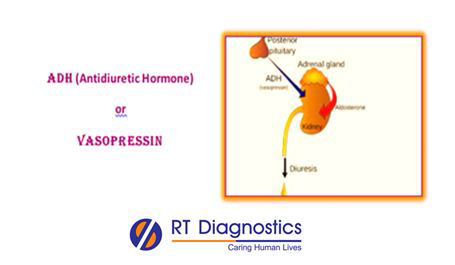ADH (Antidiuretic Hormone) Vasopressin:
CLINICAL INFORMATION :
Antidiuretic hormone is also called vasopressin helps to control blood pressure by acting on the kidneys and on the blood vessels. The role of ADH is to conserve the fluid volume of the body by reducing the amount of water passed in the urine. Vasopressin or ADH is a chemical substance produced in the body by the brain and it causes the kidneys to reabsorb water, thus release less water in urine. High ADH levels are found in patients with heart failure, liver failure, or kidney failure which causes less urine output. Usually, the symptoms for patients with high ADH include irritability and restlessness, loss of appetite, cramps, nausea and vomiting, muscle weakness, confusion, hallucinations, and personality changes.
Low vasopressin or ADH deficiency can be caused due to damage in the hypothalamus or pituitary gland known as a hypothalamic-neurohypophyseal lesion (central diabetes insipidus is a condition in which the kidneys are unable to conserve the water) and it results in a rare water metabolism disorder called as diabetes insipidus, and/or insensitivity of the kidneys to ADH (nephrogenic diabetes insipidus) it causes higher urine output. It thus causes compulsive drinking of water and hence low blood serum osmolality (due to reduced-sodium concentrations in blood) is formed. Therefore such patients with higher urine output (along with sodium) if untreated have the predictable result of dehydration, hyper-osmolarity, hypovolemia, and eventually death in severe cases. Common symptoms for patients with low ADH include excess urination (polyuria), extreme thirst (polydipsia), tiredness, and usually their sleep is disturbed due to frequent urge to urinate. Other tests include physical examination, electrolyte tests (i.e. sodium levels), plasma osmolality, and urine tests.

General instructions:
Sample Requirement: Specimen - Blood sample drawn from the vein. Test Preparation: None.
NOTE - Sample for specimen collections may vary based on the patient’s condition/cases according to the patient’s presentingcomplaints / signs or symptoms:
SPECIMEN REQUIREMENT (Special or Rare Cases) - As instructed and guided by Physician / Clinician / Pathologist / as per Laboratory’s requirements, according to procedures and protocols.
This Multi-Specialty Clinical Referral Laboratory “RTDIAGNOSTICS” provides precise and accurate tests with an extensive range of testing services to the medical centers to help in the diagnosis and identification of pathology in the test specimens for infectious diseases and also to evaluate the function of organ systems of the patient. It prevents further complications and helps to stabilize and restore health to near normalcy at the earliest without delay.



